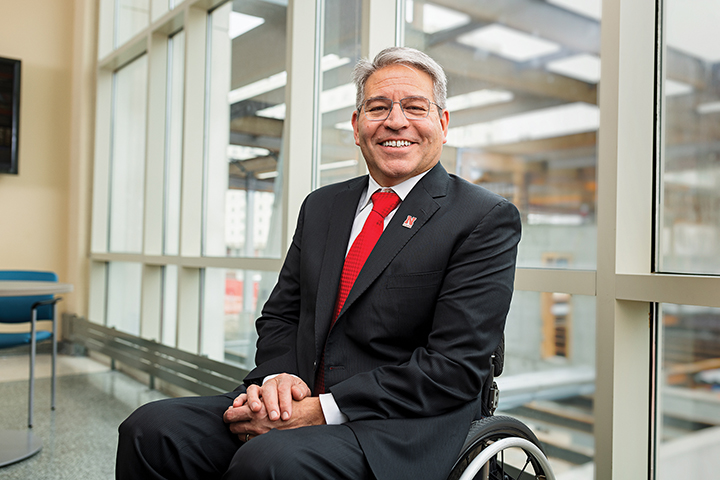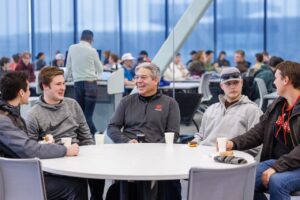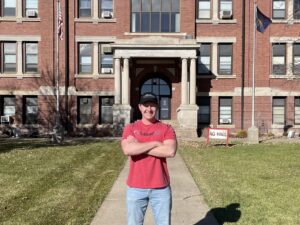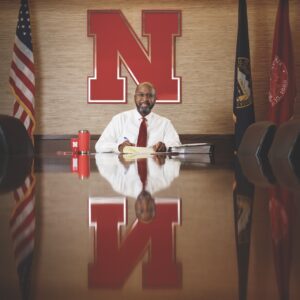Lance C. Pérez, Ph.D., became the dean of the University of Nebraska College of Engineering in 2018, following two years as interim dean. During his tenure, engineering facilities on City Campus have undergone a $190 million transformation.
Dean Pérez Aims to Grow Workforce Pipeline and Spur Economic Development
By Connie White
Ask Dean Lance C. Pérez why he wants to create “a bigger, better College of Engineering” at the University of Nebraska–Lincoln, and he’s ready with a Nebraska-centric answer.
By constructing buildings, hiring new faculty, recruiting more students and expanding research, the state’s only engineering college can spur economic development in Nebraska, Pérez said.
Engineers are in huge demand across the state and are essential to its biggest industries. Nebraska’s banking and insurance companies, for example, require software engineers to support their online infrastructure. Modern agriculture, “which is obviously very important in Nebraska,” needs equipment for automation and data analytics to manage water resources, fertilizer, seed distribution and productivity, he said.
Growing Nebraska’s pipeline of engineers, computing and construction professionals is critical to filling those and other open jobs in the state and region and to creating new jobs, Pérez said. With a bigger College of Engineering, the university will be able to support the growth of existing companies as well as the creation of new companies in Nebraska.
“Engineering plays a role in more and more sectors of both the Nebraska economy and the U.S. and global economy,” Pérez said. “We have to produce the engineers who can fill those roles.”
The kindness of Nebraskans
Pérez grew up in the Washington, D.C., area, earning a bachelor’s degree in electrical engineering from the University of Virginia and a Master of Science and a doctorate from the University of Notre Dame.
He had never visited Nebraska before coming to Lincoln in 1996 to interview for a faculty position. Nebraska’s appeal was partly personal; his dad was born in Trenton, Nebraska. He liked what he saw and took the job, with encouragement from his wife, Julie.
Twenty-six years later, Pérez is proud to call Nebraska home because of what he describes as the kindness and integrity of Nebraskans who will “help strangers without questioning it.” He said he sees those qualities reflected in UNL’s mission.
Pérez was named dean of the College of Engineering in May 2018, following two years as interim dean. During his tenure, he has overseen unprecedented growth in the college, with philanthropic giving playing a pivotal role.
“Philanthropy is just so important to enabling us to accomplish our goals and to deliver on our mission,” said Pérez, who is also the Omar H. Heins Professor of Electrical and Computer Engineering.
A historic $190 million project
The college’s transformation, the result of both public and private funding, is apparent to anyone who visits campus and sees a towering construction crane dominating the skyline. The $190 million investment represents the largest academic facilities project in UNL’s 153-year history.
The Engineering Research Center, an 87,000-square-foot building that replaced the Link, recently opened to support the college’s research efforts. The Scott Engineering Center is being renovated to provide research and lab space, and Kiewit Hall is slated to open for classes in spring 2024 with a mission of educating and supporting undergraduate students.
Pérez noted the $115 million Kiewit Hall is entirely funded by donors, with a $25 million naming gift provided by Kiewit Corp. “Without philanthropy, that building simply wouldn’t be,” he said.
Pérez said Kiewit Hall is critical to the college’s goal of growing undergraduate enrollment from 3,000 to 5,000 students.
“The quality of your facilities plays a really important role in recruitment. Students want to come to a place and a facility that show you’re taking their education seriously,” he said.
Pérez has high praise for the college’s “amazing, world-class faculty,” who he says are doing research to address the fundamental problems facing the United States and the world.
“From climate change, to disease, to better construction methods, to new approaches on computing, we have faculty doing work in all those areas,” Pérez said.
The College of Engineering, which also offers programs on the Scott Campus at the University of Nebraska at Omaha, has added 70 faculty members over the past five years as its research enterprise ramps up.
“A lot of economic growth occurs from the intellectual property and startup companies that come from having a really vibrant research enterprise,” Pérez said.
Philanthropy matters
Philanthropic support is critical to retaining those faculty, he said, while keeping a top-notch Big Ten engineering education within reach for all students through scholarships and other funding.Pérez, himself a first-generation college graduate, has a personal understanding of the importance of scholarships.
“I had scholarships. My parents couldn’t afford to send me to school, so I’ve lived that,” he said. “So, when I see students who are able to come to the University of Nebraska to study engineering because of our scholarship programs, it’s really just an amazing feeling.”










